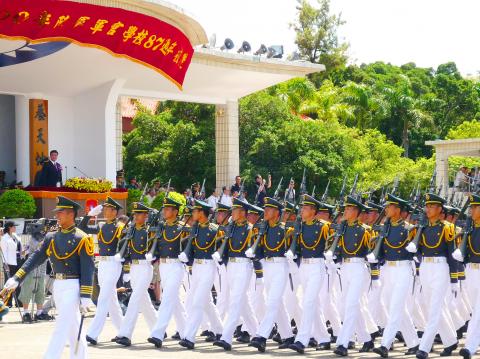Minister of National Defense Kao Hua-chu (高華柱) departed from his script yesterday during the 87th Anniversary of the Republic of China (ROC) Military Academy yesterday and emphasized that the ROC military and the People’s Liberation Army (PLA) were two entirely distinct entities.
“The nation's army is the ROC Army, and the PLA is the PLA, a fact that serving or retired officers should all know,” Kao said.
The minister’s comments came in the wake of a recent controversy over comments allegedly made by retired Air Force general Hsia Ying-chou (夏瀛洲) on a visit to China.

Photo: CNA
According to reports in the local Chinese-language media, Hsia allegedly told a gathering of retired military officers that no distinction should be made between the ROC army and the PLA, as both were “China’s army.”
Hsia has denied ever making such a comment.
Kao commended the long-term contributions of the Military Academy and encouraged students to learn from their predecessors’ spirit of sacrifice and determination to fight, glorifying the spirit of Huangpu, as the Military Academy was known when it was founded in Guangdong Province, China, in May 1924.
Turning to wu de, or martial virtue, Kao said the armed forces must pursue the ideals of defending the country and people, and maintaining social stability, adding that martial virtue was in essence a soldier’s “second life.”
“If the military cannot subscribe to those ideals or even turn its back on them, it not only turns its back on the nation that trained them, but also on the people who put their trust in them, and this will have a deeply negative impact on national security,” Kao said.
Following news of Hsia’s alleged comments, President Ma Ying-jeou (馬英九) ordered a thorough review of regulations over visits to China by retired military officers.
At a routine press conference by China’s Taiwan Affairs Office (TAO) on Wednesday, Taiwanese media asked whether the Chinese felt the continuation of the controversy over Hsia’s statement could affect military exchanges and mutual trust across the Taiwan Strait.
TAO spokesperson Yang Yi (楊毅) said the “deep exchanges” had increased mutual understanding and promoted peaceful development, which was an important development in relations between the two sides.
However, Yang also said limiting cross-strait exchanges or “actively fanning antagonistic ideologies” — a veiled reference to pro-independence forces in Taiwan — would be detrimental to the “hopes of the people across the Strait” and against the tide of cross-strait development.
It would also be unwise, Yang said.
Commenting on Yang’s remarks, Democratic Progressive Party (DPP) Legislator Tsai Huang-liang (蔡煌瑯) accused the TAO of “blatantly carrying out ‘united front’ rhetoric,” adding that the remarks were tantamount to slapping Ma in the face.
DPP Legislator Wong Chin-chu (翁金珠) said the TAO’s strong language and assumed suzerainty over Taiwan was completely unacceptable to the DPP and Taiwanese.
Wong said retired generals who used inappropriate language that betrayed the nation and undermined trust in the government would rightly be criticized.
“We have our own stance and the TAO has no right and is in no position to criticize us,” Wong said.
TRANSLATED BY JAKE CHUNG, STAFF WRITER

Alain Robert, known as the "French Spider-Man," praised Alex Honnold as exceptionally well-prepared after the US climber completed a free solo ascent of Taipei 101 yesterday. Robert said Honnold's ascent of the 508m-tall skyscraper in just more than one-and-a-half hours without using safety ropes or equipment was a remarkable achievement. "This is my life," he said in an interview conducted in French, adding that he liked the feeling of being "on the edge of danger." The 63-year-old Frenchman climbed Taipei 101 using ropes in December 2004, taking about four hours to reach the top. On a one-to-10 scale of difficulty, Robert said Taipei 101

Nipah virus infection is to be officially listed as a category 5 notifiable infectious disease in Taiwan in March, while clinical treatment guidelines are being formulated, the Centers for Disease Control (CDC) said yesterday. With Nipah infections being reported in other countries and considering its relatively high fatality rate, the centers on Jan. 16 announced that it would be listed as a notifiable infectious disease to bolster the nation’s systematic early warning system and increase public awareness, the CDC said. Bangladesh reported four fatal cases last year in separate districts, with three linked to raw date palm sap consumption, CDC Epidemic Intelligence

US climber Alex Honnold left Taiwan this morning a day after completing a free-solo ascent of Taipei 101, a feat that drew cheers from onlookers and gained widespread international attention. Honnold yesterday scaled the 101-story skyscraper without a rope or safety harness. The climb — the highest urban free-solo ascent ever attempted — took just more than 90 minutes and was streamed live on Netflix. It was covered by major international news outlets including CNN, the New York Times, the Guardian and the Wall Street Journal. As Honnold prepared to leave Taiwan today, he attracted a crowd when he and his wife, Sanni,

Taiwanese and US defense groups are collaborating to introduce deployable, semi-autonomous manufacturing systems for drones and components in a boost to the nation’s supply chain resilience. Taiwan’s G-Tech Optroelectronics Corp subsidiary GTOC and the US’ Aerkomm Inc on Friday announced an agreement with fellow US-based Firestorm Lab to adopt the latter’s xCell, a technology featuring 3D printers fitted in 6.1m container units. The systems enable aerial platforms and parts to be produced in high volumes from dispersed nodes capable of rapid redeployment, to minimize the risk of enemy strikes and to meet field requirements, they said. Firestorm chief technology officer Ian Muceus said